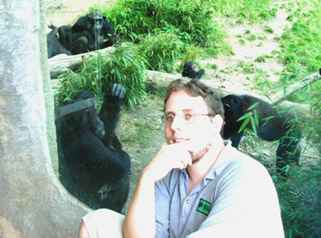It was like living on the Planet of the Apes, only we humans were in charge. For a Guilford College related summer school program this year, I undertook one of the most amazing experiences of my entire life: I studied abroad in Leipzig Germany, working at a zoo. It was combined with the Wolfgang Kohler Primate Research Center, a project of the Max Planck Institute for Evolutionary Anthropology (one of the most renowned and distinguished ape research facilities in the entire world). I worked as an undergraduate research assistant. As a History major, I was not even remotely into science before my trip. It is amazing how fast my interests broadened in such a short amount of time.
With the support of distinguished Cognitive Science professor William Idsardi from the University of Delaware, I flew to Germany and began my work as an intern taking an independent study. I did everything from working with the most sophisticated technology available for projects such as coding and transferring data, to observing and filming the wild apes with state-of-the-art Panasonic cameras used with splitters for split-screen capabilities and tripods for navigating and holding the cameras in place. I even learned how to configure complicated statistical software programs such as SPSS.
None of this, however, could even begin to compare to my work with the apes. I was given the opportunity to work with the most prominent cognitive primatology researchers in the field, such as the brilliant Professor Michael Tomasello. While assisting with these non-invasive and ethical experiments I was able to witness up close exactly how smart these apes truly are.
During a reciprocal altruism experiment with chimpanzees (e.g. trying to find out if apes can cooperate with each other or not), a complicated trial run was set up where two tables with bananas were used to give only one slice of fruit to a chimpanzee if he performed successfully. Basic safeguards, such as a pulley system, were set up on the professionally designed apparatus. When a chimp pulled on a table, the other one would go in the opposite direction.
These chimps were actually clever enough to figure out a way to ingeniously manipulate the pulley system design, in order to get as much food as they wanted from both tables without having to cooperate with us!
Seeing this sort of gave me a slight shudder of recollection; I kept thinking back to the incarcerated velociraptors in Jurassic Park that escaped and used smart problem-solving techniques to figure out how to open doors to eat the frightened humans. Apes, of course, are much nicer creatures, if perhaps slightly uncooperative. It currently remains unclear however whether chimps are willing or able to cooperate and share food with one another.
The fact remains that apes are very intelligent. While working at the center, I witnessed everything from chimpanzees forming coalitions in order to back each other up during confrontations, to others even breaking up fights to maintain peace. Observing these instances has made me question exactly how unique we humans — even with our complex societies — truly are.
Similar to my experience watching the late 1960’s sci-fi film Planet of the Apes, which depicted magnificent, intelligent and often aggressive primate conquerors kidnapping human explorers, the research center filled me with a feeling of mystified amazement and awe. Unlike in the movie however, Plexiglas walls, deep moats and sturdy cages protected me from any physical threats. In any case, this was an experience that I will never forget.
For more info on the primate center click on the link below.

